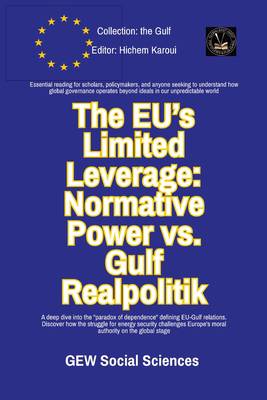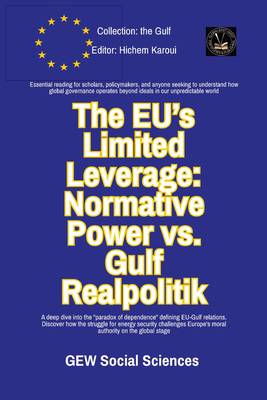
Bedankt voor het vertrouwen het afgelopen jaar! Om jou te bedanken bieden we GRATIS verzending (in België) aan op alles gedurende de hele maand januari.
- Afhalen na 1 uur in een winkel met voorraad
- In januari gratis thuislevering in België
- Ruim aanbod met 7 miljoen producten
Bedankt voor het vertrouwen het afgelopen jaar! Om jou te bedanken bieden we GRATIS verzending (in België) aan op alles gedurende de hele maand januari.
- Afhalen na 1 uur in een winkel met voorraad
- In januari gratis thuislevering in België
- Ruim aanbod met 7 miljoen producten
Zoeken
€ 73,95
+ 147 punten
Omschrijving
The EU's Limited Leverage: Normative Power vs. Gulf Realpolitik offers a rigorous and timely analysis of one of the most significant challenges in contemporary international relations. The European Union has long defined its global role through the lens of "normative power", seeking to promote democracy, human rights, and the rule of law as universal standards. This ambition, however, faces a formidable test in its relationship with the energy-rich Gulf states, whose policies are driven by a pragmatic and often contradictory realpolitik.Edited by Hichem Karoui, this scholarly volume systematically unpacks the inherent tensions in EU foreign policy. It starts by explaining the basic ideas of normative and soft power, then looks at the power relationships in the Gulf region and the complicated history between the EU and the Gulf states. The book exposes the frequent disconnect between the Union's ideals and the on-the-ground demands of geopolitics, where the need for energy security often compels compromises that challenge the EU's moral credibility.Featuring in-depth case studies and a critical examination of the "paradox of dependence," the book explores how the strategic and economic interests of key member states can fragment the EU's collective foreign policy. More than just a diagnosis of the problem, the book concludes by offering "Practical Strategies for the EU to Enhance Normative Leverage" and a forward-looking perspective on the future of this critical relationship. This is an indispensable resource for students, academics, and policymakers in the fields of European studies, international relations, Middle Eastern politics, and foreign policy analysis.
Specificaties
Betrokkenen
- Auteur(s):
- Uitgeverij:
Inhoud
- Aantal bladzijden:
- 196
- Taal:
- Engels
- Reeks:
Eigenschappen
- Productcode (EAN):
- 9781787954878
- Verschijningsdatum:
- 23/10/2025
- Uitvoering:
- Paperback
- Formaat:
- Trade paperback (VS)
- Afmetingen:
- 152 mm x 229 mm
- Gewicht:
- 267 g

Alleen bij Standaard Boekhandel
+ 147 punten op je klantenkaart van Standaard Boekhandel
Beoordelingen
We publiceren alleen reviews die voldoen aan de voorwaarden voor reviews. Bekijk onze voorwaarden voor reviews.









